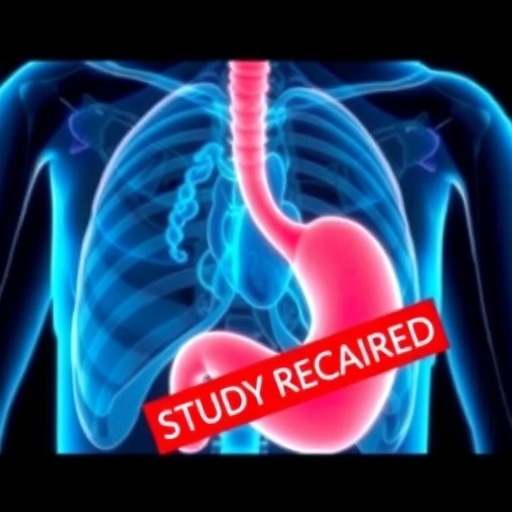In an unexpected and rare move within the oncology research community, a recent study examining the combined effects of neoadjuvant chemotherapy and arterial chemoembolization on patients with locally advanced gastric cancer has officially been retracted. Published initially in the reputable journal BMC Cancer, volume 25, article number 1663 in 2025, this retraction has sent ripples through the field as researchers and clinicians alike seek clarity on the implications of this decision and what it means for the future treatment paradigms of gastric cancer.
Gastric cancer, known for its aggressive progression and poor prognosis, often requires multi-faceted treatment approaches. Neoadjuvant chemotherapy, administered before surgery, aims to shrink tumors and enhance surgical outcomes. Meanwhile, arterial chemoembolization serves as a targeted therapy designed to obstruct the tumor’s blood supply alongside delivering high doses of chemotherapy directly to the tumor site. The synergy of these treatments was considered promising, potentially revolutionizing the clinical management of locally advanced gastric cancer by improving short-term clinical outcomes.
The now-retracted study, authored by Jianguo Yang and Juncai Li alongside colleagues from The First Affiliated Hospital of Chongqing Medical University and Yubei District People’s Hospital of Chongqing, initially reported significant improvements in patient response rates and overall survival indicators. Such findings had raised hopes within the oncology community, prompting discussions about integrating this combined therapeutic regimen into standard care protocols. However, the retraction note signals critical flaws that undermine the reliability and integrity of these findings.
Unfortunately, the retraction notice does not specify the exact reasons for the withdrawal of the paper, leaving the scientific community to speculate whether issues stemmed from methodological errors, data integrity concerns, or ethical considerations. In rigorously monitored fields such as oncology, retractions typically point to problems that compromise the validity of the study’s conclusions, warranting withdrawal to prevent misinformation or misguided clinical applications.
This development underscores the importance of rigorous peer review and transparency in clinical research. The application of neoadjuvant therapies combined with localized interventions like arterial chemoembolization demands the utmost scientific accuracy due to the high stakes involved in cancer treatment. Presenting incomplete or unreliable data can have far-reaching consequences, potentially leading to ineffective or harmful treatment protocols.
Moreover, the retraction fuels ongoing debates about the reproducibility crisis in medical research, where even high-profile journals face challenges ensuring that published results remain verifiable and dependable over time. It also highlights the crucial role of replication studies in confirming novel findings before widespread clinical adoption.
Stakeholders in this domain, including oncologists, clinical trial designers, and patients, must now approach this combined therapy with caution. While the theoretical foundation for neoadjuvant chemotherapy coupled with arterial chemoembolization remains scientifically valid, actionable evidence supporting its efficacy and safety requires further validation through robust, transparent, and ethically sound research.
The authors’ affiliations with leading institutions in Chongqing, China, point to a vibrant center of oncology research, reflecting the intense global efforts to combat gastric cancer, which remains a leading cause of cancer mortality worldwide. Nonetheless, this incident stresses the shared responsibility of researchers worldwide to uphold stringent standards of scientific conduct to maintain public trust and clinical progress.
In light of the retraction, it is anticipated that new studies will emerge, possibly incorporating advanced imaging modalities, molecular profiling, and refined patient selection criteria to better understand which patient subsets might benefit from such combination therapies. Additionally, there may be a renewed focus on optimizing dosage regimens and minimizing adverse effects to improve overall treatment tolerability.
The oncology community awaits transparent updates from the editorial board of BMC Cancer and the research team regarding the details behind the retraction. These clarifications will be critical to guide ongoing therapeutic innovations and safeguard the translation of cutting-edge research into clinical practice.
This incident also prompts a broader reflection on the pressures faced by researchers in high-stakes fields. The drive to publish novel and impactful results can sometimes conflict with the painstaking requirements of methodical science, underscoring the need for a cultural shift towards quality over quantity in scientific publication.
As the dust settles, patients, clinicians, and researchers remain vigilant, recognizing that the path to breakthroughs is often fraught with setbacks. Scientific retractions, though discouraging, are part of the self-correcting nature of research, ensuring that only robust and reproducible findings shape future medical advances.
In conclusion, while the notion of combining neoadjuvant chemotherapy with arterial chemoembolization holds theoretical potential for improving management of locally advanced gastric cancer, the recent retraction of this pivotal study serves as a cautionary tale. The medical community must redouble efforts to produce high-quality evidence before embracing new treatment standards.
Continued collaboration, transparency, and rigorous scientific inquiry will be essential to unlock the full therapeutic potential against gastric cancer and to honor the trust placed in cancer research by patients worldwide.
Subject of Research: Locally advanced gastric cancer treatment efficacy, specifically investigating the combined use of neoadjuvant chemotherapy and arterial chemoembolization.
Article Title: Retraction Note: Effect of neoadjuvant chemotherapy combined with arterial chemoembolization on short-term clinical outcome of locally advanced gastric cancer.
Article References: Yang, J., Li, J., Deng, Q. et al. Retraction Note: Effect of neoadjuvant chemotherapy combined with arterial chemoembolization on short-term clinical outcome of locally advanced gastric cancer. BMC Cancer 25, 1663 (2025). https://doi.org/10.1186/s12885-025-15033-8
Image Credits: Scienmag.com





